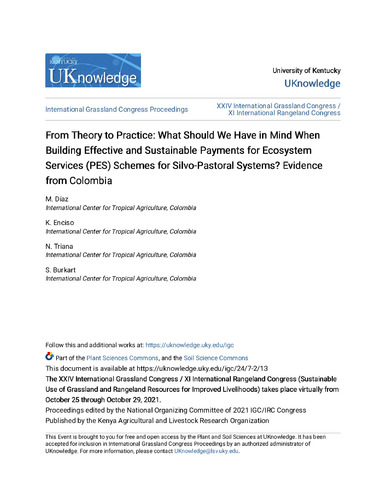From theory to practice: what should we have in mind when building an effective and sustainable Payments for Ecosystem Services (PES) scheme for silvopastoral systems? Evidence from Colombia
In most Latin American countries, payment for ecosystem services (PES) can be a useful strategy for restoration and conservation of the environment, increasing productivity and promoting sustainable development in rural areas. Despite these plausible benefits, PES implementation can be challenging due to the contextual framework in which it takes place (e.g. institutional weakness in the implementation and monitoring stages, limited connectivity among stakeholders, low levels of agricultural technification, etc.). This study aims at evaluating PES schemes for silvopastoral systems in Colombia taking into account nine dimensions based on an extensive literature review: policy, governance, land tenure regimes, knowledge base, stakeholder relationships, gender, youth, cost-effective assessment and financial sustainability. Focus group discussions, archival work and semi-structured interviews with decision makers were carried out. The results suggest that: 1) It is necessary to restructure PES schemes given their limited scope in the context in developing countries. 2) A new approach towards successful PES schemes should be adopted, transitioning from temporary conservation-oriented PES to schemes focused on the articulation of value chains and thus transmitting costs to the final consumers. 3) Although policies regarding PES have been increasing, governance systems and responsibilities assignments at this respect remain unclear. 4) PES are more likely to be efficient when accompanied by complementary strategies (e.g. technical assistance, mechanisms for market inclusion) and conservation strategies that last in time. This study revealed the difficulties in monitoring territories as well as the underlying dynamics of implementing PES schemes in farms with nettle aptitude to receive them (despite the willingness of the producers). It also highlights the importance of analyzing the cultural and economic dimensions of the producers to assess the assigned importance of nature conservation. This work enriches the debate and incites the dialogue among PES experiences in order to guide public and private strategies in developing countries.

